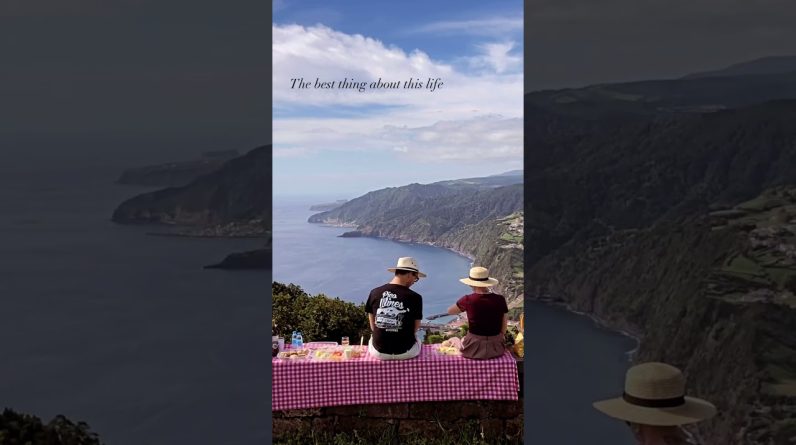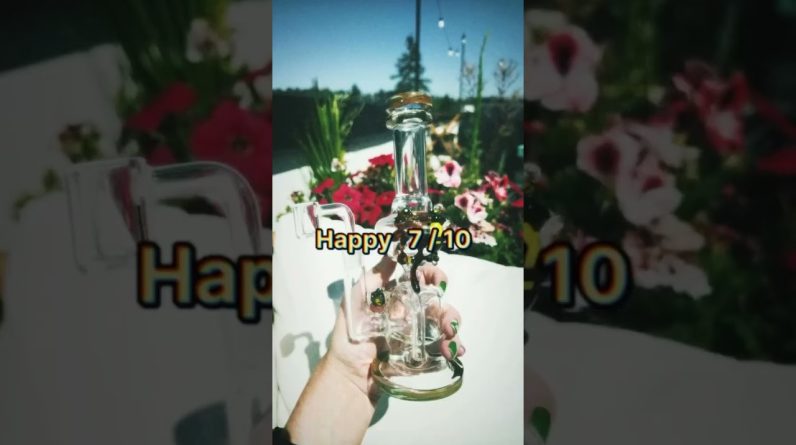When the children of the sixties left San Francisco after the Summer of Love ended (1967-1969), many headed north to live sustainably off the land. Called Back to the Landers, they grew their own food and farmed cannabis.
Cannabis was made legal for medicine in California in 1996, with little to no ordinances ever drawn up until just prior to legalization in 2016. Supply and demand was met through a loosely based medical cooperative, similar to a Cooperative Sustainable Agricultural program (CSA), where farmers, caregivers and patients worked together.
When California legalized, everyone knew the Bill wasn’t perfect, with many predicting devastating collapse of the small farmers to the north, who began the industry and created many of the cultivars we enjoy today around the world.
But no one could have predicted they would soon be in the same predicament as the country’s food farmers – unable to cover the cost of farming, with reimbursement dropping from $3,000 to $4,000 thousand dollars a pound to a mere $400.
The only difference between food farmers and cannabis farmers is, the U.S. Government isn’t stepping up to subsidize the cannabis farmers having to call it quits, as they do in the mainstream agricultural industry. There’s no safety net for our historic heritage farmers to the north in California, and no competing with large-scale corporate operations.
One thing is clear, the craft cannabis grown outdoors in the sun in some of the richest soil in the world, can not be compared to its indoor cousin, supported by electric lights.
Witnessing
Note from Sharon: In October of 2021, my associate, Farah Tariq, Esq. and I, went on a farm tour encompassing the Emerald Triangle (Mendocino, Humboldt and Trinity counties) and beyond, on a road trip that lasted nearly a month.
Farah is a Harvard educated attorney who spent ten years in Manhattan in New York, selling her soul in corporate law, then crossed over as in-house legal counsel for cannabis corporations. She especially needed to witness, to meet the farmers and learn the other side of the industry, from their perspective.
Our goal was to visit heritage farms and listen to their stories. These three farms from three counties within the Emerald Triangle are just a few of the small craft farmers currently struggling in the new legal market.
Heritage : Denoting a traditional brand or product regarded as emblematic of fine craftsmanship
Swami Select, Mendocino
Swami Chaitanya & Nikki Lastretyo
Originally from the State of New Jersey, Swami Chaitanya, moved to San Francisco after partaking of cannabis for the first time in 1967.
“Swami grew his first plants on Telegraph Hill in 1978,” partner Nikki Lastretyo shared. “He came to San Francisco as a full-on hippie. I was born and raised in the city – a flower child forever – first smoking pot in 1969 with a neighborhood garage band. Changed my life. I attended San Francisco State University, and I say I studied business, but all my experience at that time came from dealing weed on campus.”
Ever humble, Nikki’s background is in journalism, working at the San Francisco Chronicle and for KRON-TV during the 80s and 90s.
Swami attended Wesleyan University in the State of Connecticut. A Fulbright Scholarship recipient, he studied German Literature in Germany; then went on to attend the State of Wisconsin, earning a Masters in history, with a minor in photography; ending up at the University of Pennsylvania and the Annenberg School of Communications.
After meeting, the two traveled the world, spending formative time in India and Asia.
“We were living in the Himalayas and had many neighbors growing ganja,” Swami explained. “When Nikki returned to California she met Tim Blake and started working on his farm – which was illegal at the time.”
When Swami returned from India they chose Mendocino, then acquired the ranch with the intent of making it into a sanctuary – planting cannabis was two-fold, as an income and for their own use.
Clean Green certified since 2011, Swami Select sits on 190 acres and is the longest running brand in Mendocino County. It’s crop is planted in the shape of a Sri Yantra, with sacred statutory and temples honoring several traditions throughout.
Currently listed on its website are cultivars Magic Melon, sourced from the equally historic Humboldt Seed Company; and Raspberry Parfait, full of flavorful terpenes myrcene, limonene and ocimene. Krishna Andavalou, host of Viceland’s Weediquette, called Swami Select, The Dom Perignon of cannabis.”
“Our farm is very special, we have an unusually large, flat meadow up in the mountains – perfect for growing – it’s our own little valley,” Nikki said. “We established Ganja Ma as the Goddess of cannabis and incorporate her blessings into all we do.”
Using regenerative methods of farming in full-sun, typically using seeds they’ve harvested themselves, in living soil that’s been growing itself for many years. All of this combined with their own spiritual practices and Swami’s intuitive method of working with the plants make their cultivars special.
“Right now we only sell beautiful sungrown flowers,” Nikki said. “Our cannabis is unique because it’s aged – we store it extremely well, so it’s still super fresh a year later – testing higher for CBN than most – making it more relaxing, with a super smooth smoke.”
Education and outreach is everything to this small farm, and marketing their brand gives hope they can survive the harshness of the legal market.
“Swami is a founding member and sits on the Board of Directors of Origins Council,” she continued. “We are both flower judges in Tim Blakes long running Emerald Cup, which he started just down the road from our farm in 2004.”
Recognizing this type of craft cannabis farming is crucial to their survival, and the two hope that cannasseurs will see the benefits of the full terpene and cannabinoid profile of sungrown cannabis – which they’ve come to know as being better and healthier for humans for flavor and effect.
“The small farms must survive, as we fulfill a need for purity and sophistication of a fine flower made flavorful from the sun,” Nikki surmised. “So many have had to quit due to the high costs and unfounded requirements of the State, County, and various agencies – namely Fish and Wildlife, and Water Board. But those who do survive will be here to supply quality over quantity – that’s what we do and will continue to do.”
For more information on Swami Select visit, www.swamiselect.com
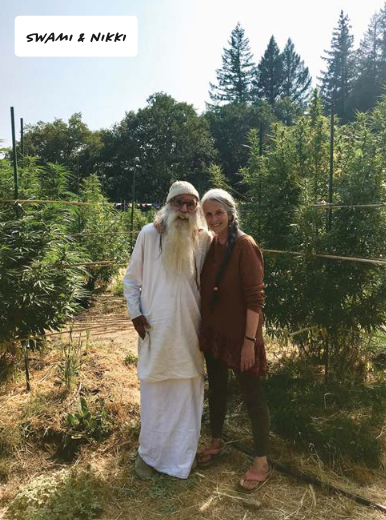
Huckleberry Hill Farms, Southern Humboldt
John Casali & Rose Moberly
When John Casali was five years old, his mother moved them from San Francisco to the farm that would become Huckleberry Hill Farms. His earliest memories are learning about growing food and cannabis from is mom. They lived sustainably until CAMP was enacted and the helicopters came.
“My mom and stepdad decided the local fishing industry would be safer, and they left the farm to me,” he shared. “When I was 24, my buddy Todd Wick and I were raided, then arrested a year later.
They were each sentenced to ten years in Federal Prison, and ended up working on a government farm associated with the privatized prison system for profit for about 12 cents an hour.
“We were experienced farmers, licensed to operate heavy machinery, so we continued to farm in prison.” he said.
The purpose of prison is to reform, but Casali said he had little in common with the other prisoners from the failed War on Drugs within the drug recovery program.
“I learned about drugs in prison,” he revealed. “I learned about addicts and how they lose their ability to control what they consume and how much. Personally, I don’t believe cannabis falls into that category at all.”
After serving eight years, less two years for good behavior, Casali returned to the farm he loved within the newly created medical market, made legal the year he entered prison in 1996.
“There were 50 people waiting to help me get back on my feet, because they know it could happen to anyone,” he said. “I never had any doubts I’d continue to farm this plant.”
With sentimental and ornamental gardens and statuary throughout the farm, Casali and Rose have created several cultivars in memory to those who have passed.
“My mother died while I was in prison of a heart attack on the fishing boat at sea,” he explained. “She taught me everything I know about farming. This farm is her legacy.”
To honor her, they created a new cultivar from a favorite strain she created, Paradise Punch, by crossing it with both Blueberry Kush and Lavender Kush, to make Mom’s Weed.
When Rose became part of his life on the farm, Casali said it could no longer be just about him.
“Rose’s mom, Margie Zietz, passed away from cancer in 2020,” he said. “We took Paradise Punch and crossed it with Rose’s mom’s favorite strain, Wishful Thinking, creating Margie’s Magic.”
Another cultivar created, Whitethorn Rose, used the same cross as Mom’s Paradise, crossed with Lemon OG, that spoke to this writer like no other. Created in honor of a town in Southern Humboldt lost to raids.
“Whitethorn was a big part of my childhood,” he said. “When the raids began many of the small towns supporting farms turned into ghost towns.”
Casali said he and Rose are just grateful to work the farm for another season.
“To be able to farm this land that my mother found for us and loved is everything,” he surmised. “Did I take it for the team in prison? Yes and no. We are going forward with love and good intentions for this life we love on the farm. That’s really what it’s all about.”
For more information on Huckleberry Hill Farms visit, www.huckleberryhillfarms.com
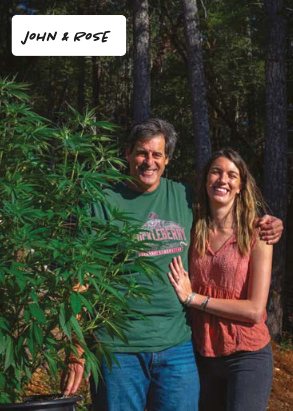
Sol Spirit Farm & Sol Spirit Retreats, Trinity County
Walter Wood & Judi Nelson
Walter Wood and Judi Nelson have been farming on the same spot, on the south fork of the Trinity River for 20 years.
Walter and Judi met at a memorial for Jerry Garcia of the Grateful Dead in Los Angeles just after. When Judi wanted to go to the Rainbow gathering down in Mexico, someone asked Walter to work on a bus to travel there.
“We never found the gathering, but had a great time and smoked a kilo of bud in no time as we wandered down to Mexico and back,” he laughed.
Walter had been working for Los Angeles Water & Power and acquired a permanent back injury, when he discovered that cannabis greatly reduced spasms and pain. The couple ended up in Louisiana together for Judi’s work as a Physical Therapist. But with a lack of cannabis, they headed back to California, initially growing their own indoors in the City of Arcata, where they landed in Humboldt County, before they settled on the property in Trinity County.
“We became homesteaders,” Walter explained. “Our farm is organic and sustainable, with grown in the sun cannabis. Our home is off the grid, made with straw bales. We have chickens and a few pigs that we do intensive rotations with, conditioning the soil as they graze.”
“Earth Conscience Cannabis,” is its slogan, with Walter stating that most of the regulations under the legal market seem out of step with the farming of, and the harmless nature of the plant.
“Environmental stewardship is our goal, producing exceptional craft cannabis,” he added. “Our team is small, but they are seasoned craft cultivators, producing small batches. We grow with intention and love.”
Growing in native soil, Walter said, allows the plant to fully express the terroir that’s made the region famous. Cultivars such as Sol Cookies, Sol Shine, Mother’s Milk, and the classic Sour Diesel don’t disappoint.
In an effort to open up to the community at large, as well as subsidize the farm, Judi has turned a flat meadow into glamping grounds, offering up overnight stays in well suited glamping bell tents with real beds and linens. As a plus, each tent has its own private bath house with hot running water and fluffy towels.
“Our breakfasts are farm to table,” Judi said. “We use organic eggs, produce and livestock from the farm, and locally sourced goods from other farmers in the area. Stays include guided tours of the farm by our master cultivator.”
Guests have enjoyed seeing how the farm clones, plants, grows, harvests, and manicures their flowers for market. They also can take advantage of river rafting on the nearby Trinity River, or attending a Zumba, Yoga, or Pilates class for a fee.
”The plant is sacred medicine, and it’s a huge part of our lives,” Walter concluded. “We hope that our guests will come away excited and inspired to join a regenerative future. Our hope is that the small, craft sungrown farmers products are realized for their quality soon, so that we can survive corporatization and commodification of this sacred plant.”
For information on Sol Sprit Farm visit, www.solspiritfarm.com
For more information and to book a retreat at Sol Spirit Retreats visit, www.solspiritretreats.com
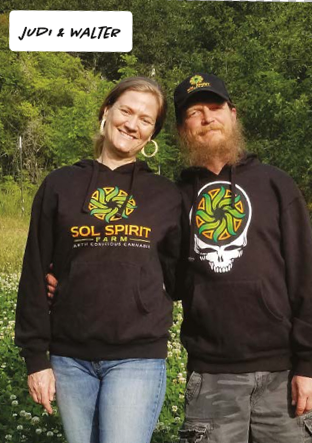
Written and Published By Sharon Letts in Weed World Magazine Issue 157
The post The Weed Traveler: The Emerald Triangle – Historic and multi-generational farmers struggling in a legal market – By Sharon Letts appeared first on Weed World Magazine.

